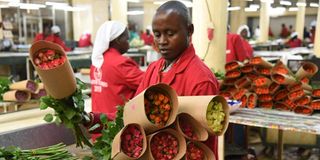Is market capitalism, specialisation, comparative advantage a farce?

Employees at Equator Flowers Farm in Eldoret, Uasin Gishu County pack flowers for export on March 16, 2020.
What you need to know:
- Africa’s dismal trade performance has created near-universal perception that it is poor due to its inability to leverage international trade.
- We cannot stimulate global demand by lowering the price of miraa, coffee, tea and cut flowers.
Africa’s low share of global trade, which has stagnated, at a minuscule three per cent for the past 60 years, is a major source of angst among development experts.
Political and intellectual rhetoric, policy interventions, funding and capacity building related to trade and trade facilitation have had little success. Placing Dr Mukhisa Kituyi, an African, in the strategic position as head of UNCTAD, the United Nation’s trade and development portfolio, was of no consequence to the continent’s trade trajectory and composition. Dr Ngozi Okonjo-Iweala of Nigeria is the World Trade Organization director-general.
Africa’s dismal trade performance has created near-universal perception that it is poor due to its inability to leverage international trade since trade is “an engine of economic growth”. International bodies like WTO, UNCTAD, the World Bank and OECD say Africa would benefit enormously by pursuing international trade that is anchored on specialisation, comparative advantage and market capitalism.
The idea that governments should not interfere with the private sector was first raised by Scottish economist Adam Smith in his 1776 book, The Wealth of Nations. Regarded as the Father of Economics, Smith birthed and promoted the laissez-faire economic theory.
It was, perhaps, during the trans-Atlantic economic policy alliance between British Prime Minister Margaret Thatcher and US President Ronald Reagan that international organisations promoted free market capitalism as a one-size-fits-all policy prescription for developing countries, including Kenya.
Low-value activity
Trade champions decry Africa’s reluctance to embrace market capitalism. They contend that Africa would be better off specialising in, producing and exporting the relatively less expensive domestic goods and importing relatively more expensive goods. But while models do, in fact, show that such an arrangement could deliver benefits to all participants, this premise is impractical on many levels.
Comparative advantage notwithstanding, we cannot uplift ourselves out of poverty by focusing overwhelmingly on low-value activity like growing coffee, tea and mangoes, selling them on a largely buyer-driven global market and using the proceeds to acquire expensive equipment and other products. Laissez-faire and the strict specialisation as promoted by the West is akin to entrenching poverty.
Predictably, the IMF will soon demand that Kenya gets rid of its state enterprises across strategic sectors yet such entities have played a big role in sustainable development elsewhere. There is overwhelming evidence that China’s unfolding miracle, touching all spheres of human technology, is orchestrated by its state-owned enterprises. In one generation, China has risen from a backward rural society to a modern top-tier economic powerhouse.
International trade has played a major role in Chinese transformation but they did not limit themselves to a low-level rural economy despite their comparative advantage. China opted for a strong government hand in steering the economy. The state also challenged its citizens to play in the technological premier league dominated by America and Europe. On Friday, Beijing silenced its critics by becoming the second country to land a vehicle on Mars.
Stimulate global demand
Africans must reject the pressure to accept untested and unworkable economic theories. Let’s pay attention to actions, not words, of neoliberal Americans and Europeans who subsidise their farmers to grow crops, fruits and vegetables instead of sourcing affordably and reliably from elsewhere. We must denounce the folly of producing that which we do not consume — like flowers, cocoa and coffee — and consuming what we don’t produce. We must get rid of colonial projects that appropriated productive lands for the cultivation of crops meant to satisfy the imperial palate.
Comparative advantage and specialisation arguments collapse when we consider that demand for Africa’s key agricultural products is mostly price inelastic. We cannot stimulate global demand by lowering the price of miraa, coffee, tea and cut flowers. Even if this were to happen, and expand rural employment opportunities, incomes are unlikely to rise due to surplus labour. With loss of productive, rain-fed farmland coupled with diminishing marginal returns, Africa would need to look elsewhere for growth and development.
The world is dynamic, competitive and integrated and is driven by realpolitik and prevailing economic realities — not some archaic theories. Africans must compete on all spheres and inspire greatness like everyone else. The laissez-faire economic theory is nothing but the debunked trickle-down nonsense — but on a global level.
We must reject utopian ideas and embrace that which has worked elsewhere. And here, China is a fine example.
Mr Chesoli is a New York-based development economist and global policy expert. [email protected]





